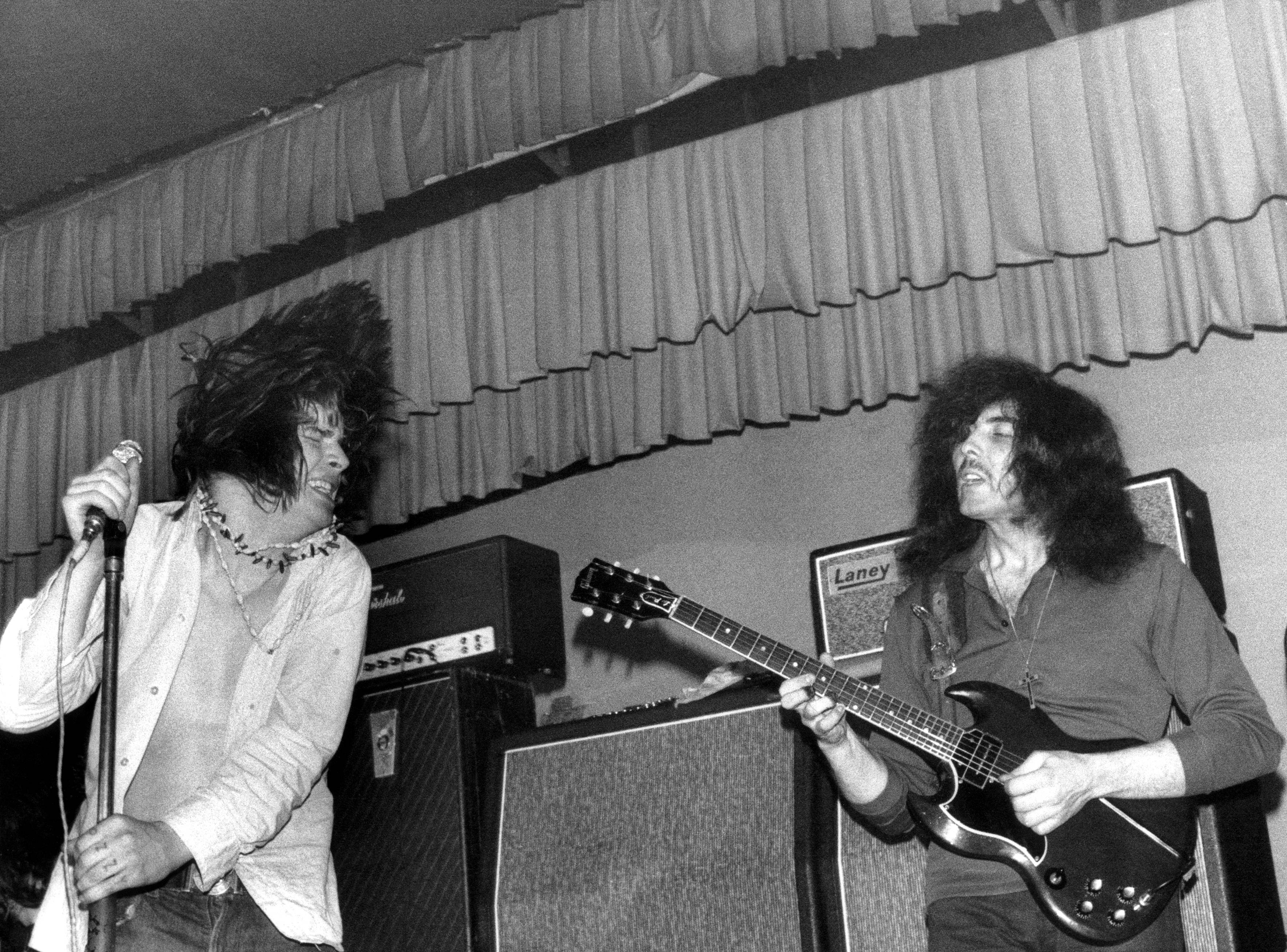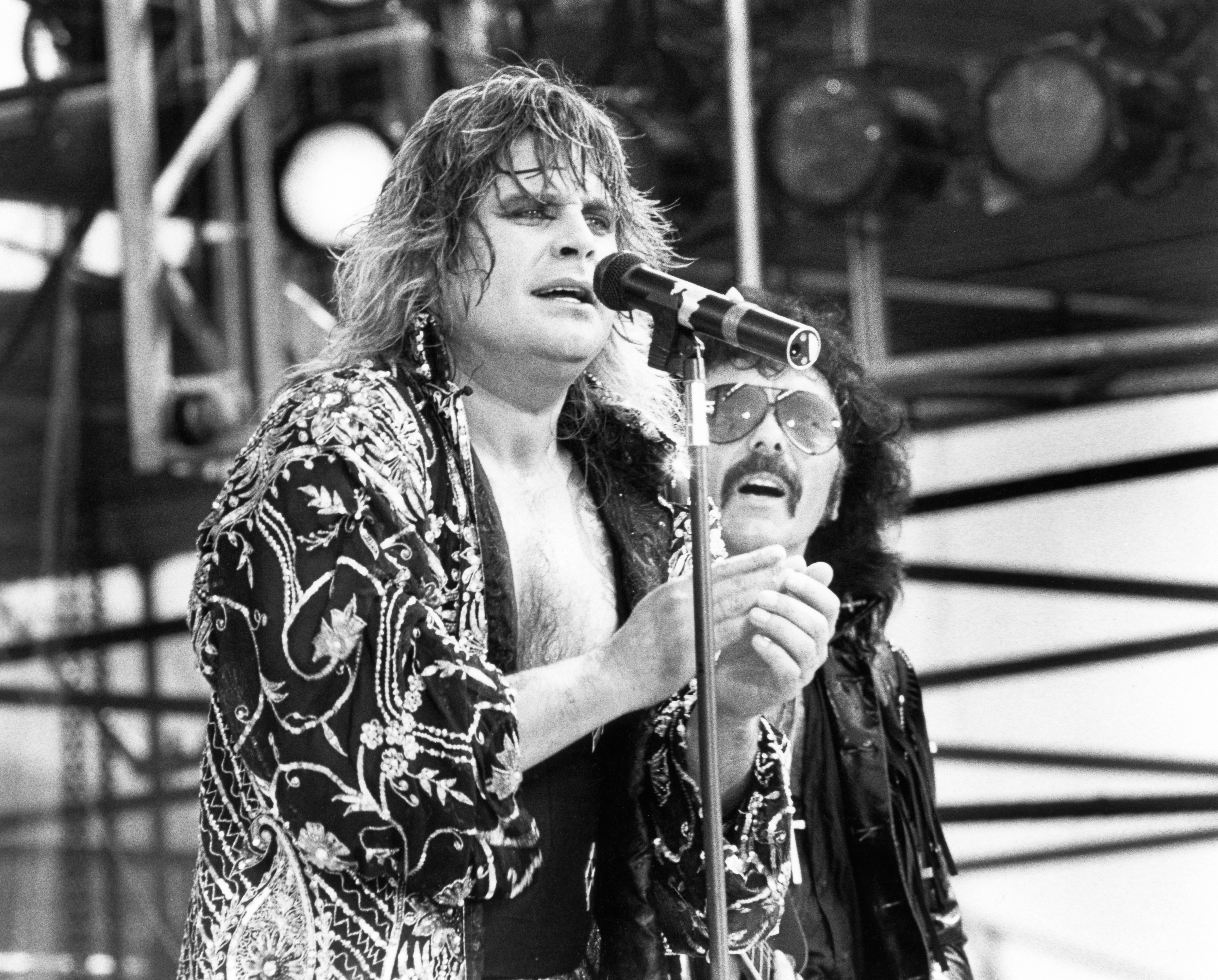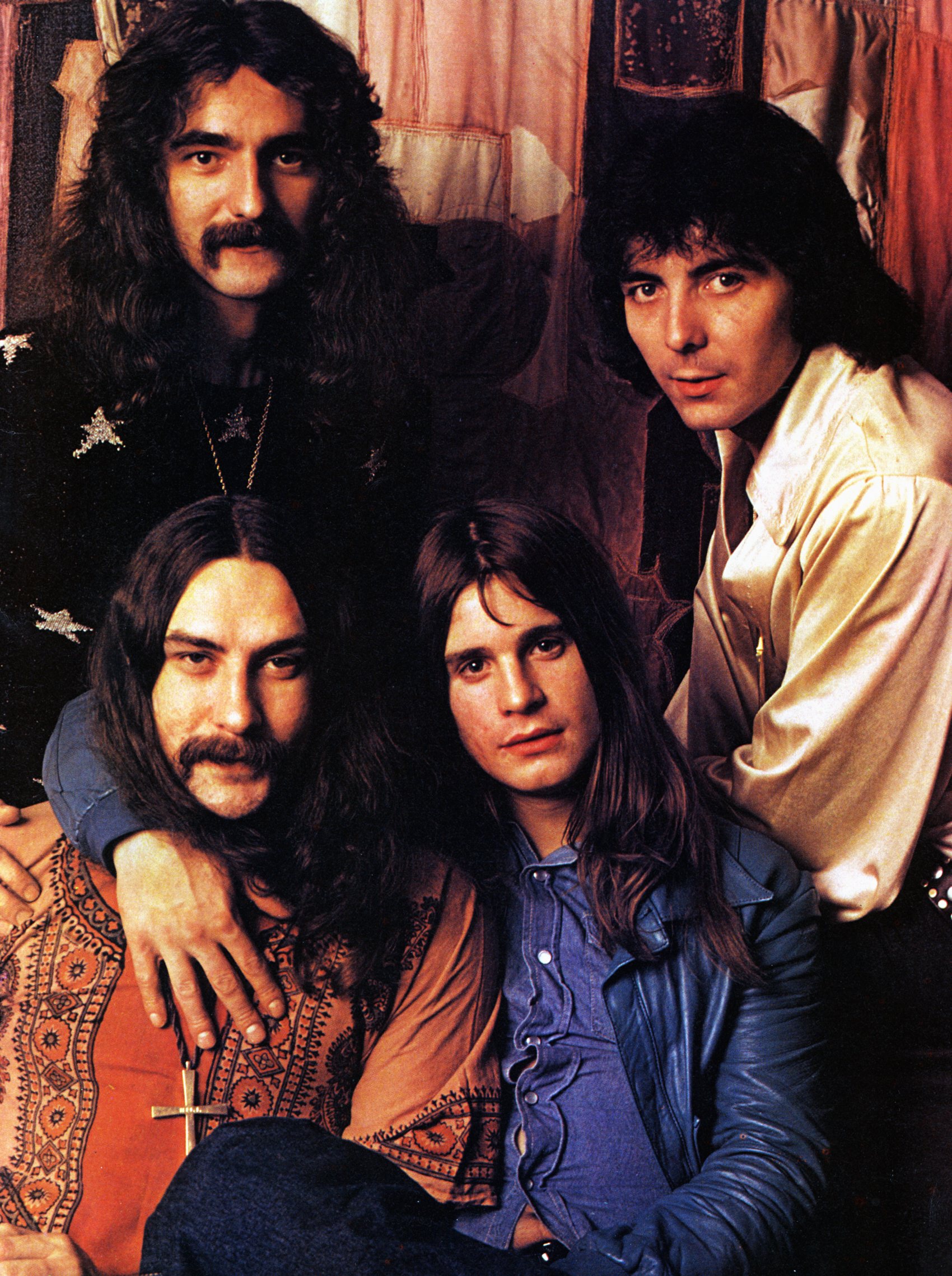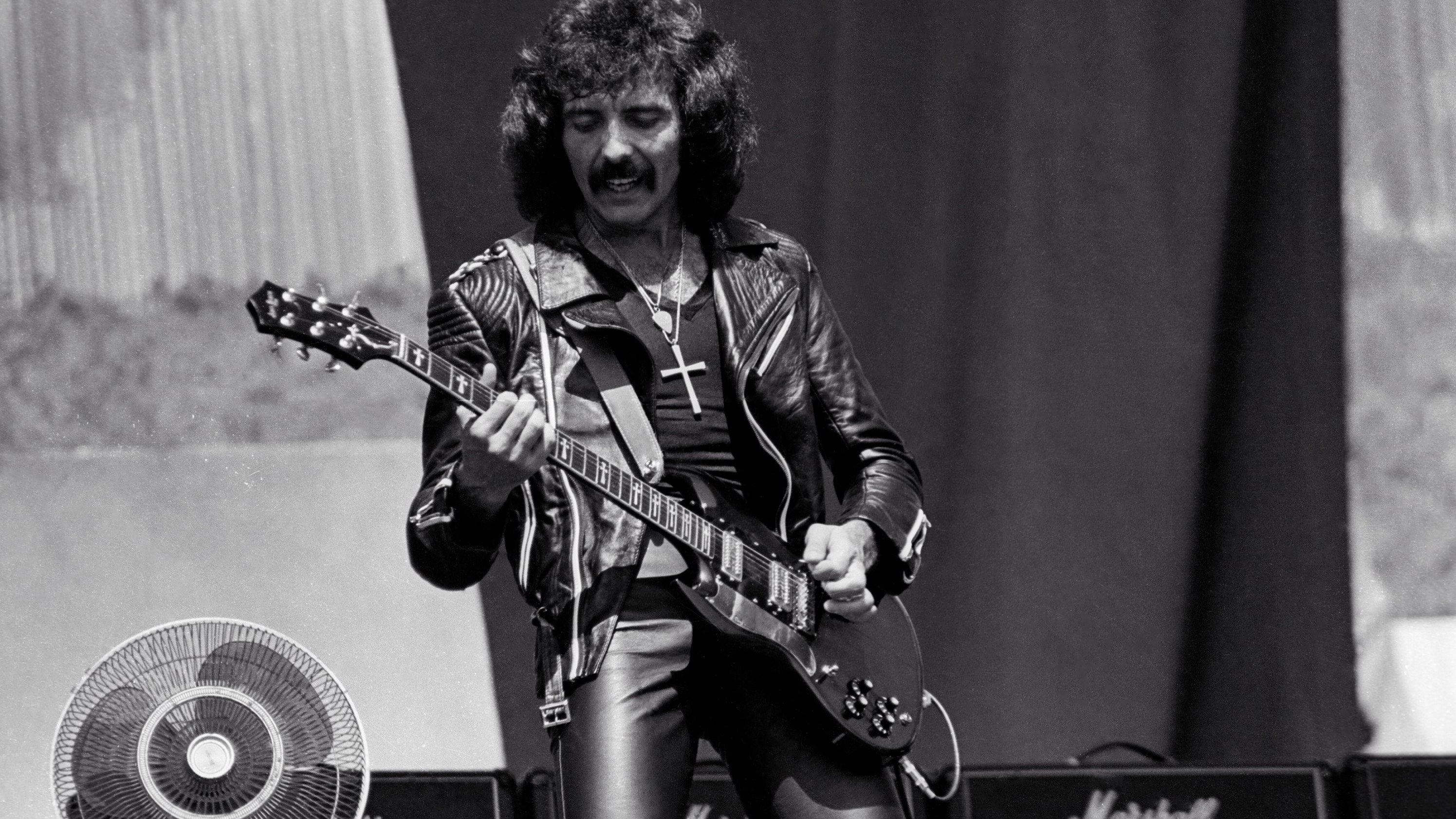Since the formation of Black Sabbath – the original and greatest heavy metal band – guitarist Tony Iommi has been the one constant in their history.
Born on February 19, 1948 in Heathfield Road Hospital near Birmingham city centre, he was the only child of Italian immigrants and was named after his father, Anthony Frank Iommi.
He might never have succeeded as a professional guitar player after losing the tips of two fingers on his right hand in a welding accident at the age of 17. But, with the use of home-made artificial fingertips, he developed a signature heavy riffing style that helped shape an entire genre of rock music.
The guitarist’s autobiography, Iron Man: My Journey Through Heaven And Hell With Black Sabbath, is aptly titled. Iommi’s story has remained inextricably linked to that of the band he has led through good times and bad.
In conversation, as in his book, he speaks candidly about every aspect of his life and career: music and money, love and violence, drugs and death, Ozzy Osbourne and Sharon, and the small matter of a dwarf dancing around Stonehenge.

As you recall in your book, you had a lot of fights in your teenage years. Why was that?
I guess it was a way of getting things out of you. The area where I lived was quite rough. There were gangs, a lot of fighting in the streets. My mother didn’t like me going out. I used weights in my room, and then I got into judo, karate and boxing.
Did you enjoy beating the shit out of people?
It wasn’t so much that, it was that people would beat the shit out of you if you didn’t do it to them. That’s how it was where I lived. People would pick on you and you’d always end up fighting.
You even carried a knife.
At one point, yes. I was in a gang, and if a rival gang saw you walking around their area they’d start. There weren’t many nights when I would go home without having had a fight. But a lot of that stuff died off when I got into music.
In 1969, as the 20-year-old guitarist in Black Sabbath, what were your hopes and dreams for the band?
The dream was just to play in London, for a start. But the ultimate thing for us was to make an album. And when we got the chance we couldn’t believe it.

Could you believe how bad the reviews were for that first Sabbath album, Black Sabbath?
It was slammed by the critics. None of them understood it. It was hurtful. We were young, totally green, and we took it personally.
Why were Sabbath so misunderstood back in those days?
There was a lot of soul and blues music around at the time, and our album was so different. People said: “Blimey, that’s a bit severe!” The inverted cross on the album cover, we had nothing to do with it, but it made people think we were into black magic. In the early days, people were frightened of us.
Do you recall where and when you first sensed that Sabbath were really breaking big?
It was when we first went to America, in 1970, that it properly hit us. In New York we played the Fillmore East, which was just mind-blowing.
Why did Sabbath’s music resonate so powerfully with so many people?
We’re basic, working-class people, and the music reflected that. People could relate to what we do.
In the early years, Black Sabbath were managed by Don Arden, the notoriously ruthless impresario and father of Sharon Osbourne. Were you intimidated by Don?
I think he intimidated everybody. And the way they dealt with people then was quite different to now. It’s all lawyers now. Back then they’d send someone to beat people up. We saw that a few bloody times. But when Don managed the band again in the 80s I didn’t feel threatened by him at all. I actually felt a bit sorry for him. He used to call me in for meetings just to have someone to talk to. He was quite a lonely person.
You say in the book that you were “involved” with Sharon before Ozzy was.
Well, when Don managed us in the 70s, Sharon used to work for Don. So when we were in LA I always had my dealings with Sharon. We did see each other, go out for dinner occasionally, but that was about it.
What were the highest and lowest points of your career in Black Sabbath?
We had some incredible high points with Ozzy and with Ronnie James Dio, and the reunion with Ozzy in 1997 was fantastic. I always thought it would happen one day, but you never know for sure. To walk on stage together after all those years and play again, it was very emotional for us, and for the audience too. The lowest point of my career was trying to hold the pieces together in the 80s and 90s. I kept the Sabbath name, and I took a lot of criticism for bringing other people in. I just wouldn’t let go. But when everybody but me had been replaced you think, what happened?
When This Is Spinal Tap was released in 1984, Sabbath had recently played gigs with an out sized Stonehenge stage set. When you saw the movie – with its famous miniature Stonehenge scene – did you take it personally?
No. I thought it was funny. I mean, I thought our Stonehenge was funny when I saw it. When we were rehearsing on the floor of the NEC, they started bringing the stage set in, and I just couldn’t believe it – all these stones just kept coming and coming. We only used it for a couple of gigs.

When Sabbath’s original line-up reunited for Live Aid in 1985, you all looked wasted. What kind of state were you in?
Not a very good state [laughs]. On the night before, we hadn’t seen each other for so long and we got absolutely pissed. I had a dreadful hangover, and we were on at 10 o’clock in the morning. I had to put my dark glasses on. I felt bloody awful. But the night before was great.
Do you have a cruel sense of humour?
A bit, yeah.
And in the early days of Sabbath, Bill Ward bore the brunt of that.
He did. We’d all pick on Bill. And he loved it. If you didn’t pick on him he’d go: “Is everything alright?”
In hindsight, was it a little too cruel to set Bill’s beard on fire?
Oh dear. It’s pretty sad, really, isn’t it?
You also scared the hell out of producer Martin Birch during the recording of 1980’s Heaven And Hell album.
Well, I couldn’t help that. Martin was just so gullible. I got a piece of balsa wood about a foot long and carved a figure out of it. I wrapped it in a black rag and I kept it in my briefcase. One day at the studio I opened my briefcase and made sure that the head of the little effigy was sticking out. And Martin saw it. He said: “What’s that?” I went: “Oh, nothing,” and shut my case. Martin kept asking me about this thing for days. Eventually Martin said: “It’s me, isn’t it?” He was bloody petrified.
Do you think Ozzy ever truly forgave you for firing him from Sabbath?
Well, the way it broke up, due to drugs and alcohol, was sad. But I was doing drugs as well – I’m not a bloody angel. But when Ozzy did it it all just came to a stop. He just didn’t seem to be into it any more. The band had to then find a new beginning.
Who was the biggest druggie you’ve ever known – Ozzy, or Glenn Hughes?
[Laughs] I’ve known a few, but Glenn, yeah. He’s so lucky that he came out of that. When Glenn was in Sabbath we did try to help him. I booked him into rehab and he just ran off. But you have to decide for yourself to do it, and eventually Glenn did. Music is his drug now. But he was difficult, yes.
In his book, Glenn says he was a crack addict when he was in Sabbath. Did you know that at the time?
God knows what he was doing. He’d have dealers coming from all over, and we’d shoo them off. But the drugs always seemed to get to him. I had a bodyguard to watch him and it still managed to get through.
But you weren’t shooing away all the dealers.
No, I was shooing some of them into my room.
Were you a drug addict, or were you able to keep it all under control?
I’d say that I was one of those guys who could keep it under control, but other people would say: “Yeah, you were an addict.” I don’t know what I was. I had a bash at doing a lot of coke, I must say.
- Ozzy Osbourne: My Life Story
- Tony Iommi on inventing heavy metal, drinking with Gillan, and not being evil
- Glenn Hughes: My year of living dangerously with David Bowie
- Black Sabbath's Geezer Butler on knives, vegan food and wanking bandmates
How much coke would you do in a session?
Oh, God… some nights two or three grams.
Did you ever try heroin?
No. I never fancied that. I used to like doing coke, but then it went against me. It started making me feel worse rather than better. I got more paranoid. So I cut down and then I stopped. I’d have an occasional line, but I wasn’t doing it on a regular basis.
As parent, what is your stance on drugs?
Fortunately my daughter [Toni] has seen that since she was young, and it turned her totally against all that. It would be hard to reprimand your kid after you’ve gone through doing it.
Did you have close relationship with your own parents?
Not really. My father, we didn’t really get on when I was young. I didn’t see him that much. He was always away working. And later on, although we did have a good relationship, I was always away.
You were with your father when he died from emphysema in 1981. You say that you dealt with your grief by working.
Yes, that was the only way I could deal with it – to get out and keep my mind occupied. But of course you keep drifting back to seeing what happened to him. It stays in your mind forever, that picture. I started writing songs. It’s a bit grim, really, but when he was in the coffin I went and sat in the room with him and I wrote an instrumental. I’ve never actually released it as yet.
What do you do in your personal life that would surprise a Sabbath fan?
I just live a normal life. I like to go out for walks. I’ve got some great friends – Bev Bevan [ex-Sabbath and ELO drummer], Jasper Carrott, people I’ve known for years, and we get together every week. We call it the Brummie mafia.
Have you ever thought about shaving off your moustache?
The last time I did it was around Sabbath Bloody Sabbath. I was having a shave and I went, whoosh, and I took one of the ends off. I tried shaving the other end off, and in the end I kept going at it and it was getting shorter and shorter till I had the little Hitler one, and I just shaved it off. A day or two later we were doing the photo shoot for the album cover – just typical. I don’t even think about it now. Occasionally it’s a nuisance to keep trimming it and dyeing it, but it’s still there at the minute [laughs].
In the 42 years since Black Sabbath began, you’ve written so many great riffs. Was there ever a point when you felt that the well was running dry?
Yeah. We did Vol 4 in Los Angeles. In 1973 we went back to do Sabbath Bloody Sabbath, and I couldn’t think of anything. My brain just didn’t react, nothing worked. It was disastrous. We came back to England and had a bit of time off, and then we went to Clearwell Castle in Wales. We rehearsed there in the dungeons, trying to get some vibe and atmosphere, and it worked. The first thing I came up with was the song Sabbath Bloody Sabbath. And that became the benchmark for the album. Once you come up with ‘the one’, it goes from there.

Are you a perfectionist? A difficult man to work with?
I have been. The music always had to be right in my head, the way I heard it. That was one of the problems we had when Ronnie first joined the band, before I realised that everybody needs to have a say in it.
How did Ronnie’s death affect you personally?
It can’t help but affect you, a friend going so quick. It makes you realise how vulnerable you are. It was a hell of a shock for me. Even now it’s hard to believe he’s gone. But I’m glad we got back together with Ronnie in those last years, with the Heaven & Hell thing.
Looking back, are you happy with what you’ve achieved personally?
I’m very happy. I just hope I don’t keel over in the next year, because I’m really enjoying the way things are.
And if you had your time again, would you do anything differently?
Probably. But life has worked out fine for me.

